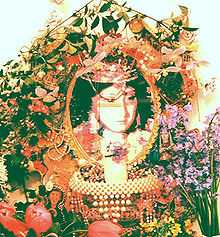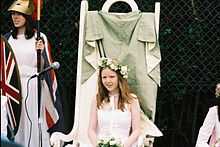May Queen
The May Queen or Queen of May is a personification of the May Day holiday, and of Springtime and also Summer.

Festivals

Today the May Queen is a girl who must ride or walk at the front of a parade for May Day celebrations. She wears a white gown to symbolise purity and usually a tiara or crown. Her duty is to begin the May Day celebrations. She is generally crowned by flowers and makes a speech before the dancing begins. Certain age groups dance round a Maypole celebrating youth and the spring time.
Sir James George Frazer found in the figure of the May Queen, a relic of tree worship:[1]
According to folklore, the tradition once had a sinister twist, in that the May Queen was put to death once the festivities were over. The veracity of this belief is difficult to establish; it may just be a folk memory of ancient pagan customs. Still, frequent associations between May Day rituals, the occult and human sacrifice are still to be found in popular culture today. The Wicker Man, a cult horror film starring Christopher Lee, is a prominent example of these associations.
History
In the High Middle Ages in England the May Queen was also known as the "Summer Queen". George C. Homans points out: "The time from Hocktide, after Easter Week, to Lammas (August 1) was summer (estas)."[2]
In 1557, a London diarist called Henry Machyn wrote:
"The xxx day of May was a goly May-gam in Fanch-chyrchestrett with drumes and gunes and pykes, and ix wordes dyd ryd; and thay had speches evere man, and the morris dansse and the sauden, and an elevant with the castyll, and the sauden and yonge morens with targattes and darttes, and the lord and the lade of the Maye".
Translation: On the 30th day of May was a jolly May-game in Fenchurch Street (London) with drums and guns and pikes, The Nine Worthies did ride; and they all had speeches, and the morris dance and sultan and an elephant with a castle and the sultan and young moors with shields and arrows, and the lord and lady of the May".[3]
Maintaining the tradition

Many areas keep this tradition alive today. The oldest unbroken tradition is Hayfield, Derbyshire[4] based on a much older May Fair. Another notable event includes the one in the Brentham Garden Suburb, England which hosts it annually.[5] It has the second oldest unbroken tradition although the May Queen of All London Festival at Hayes Common in Bromley is a close contender. A May Day festival is held on the village green at Aldborough, North Yorkshire on a site that dates back to Roman times and the settlement of Isurium Brigantum. A May queen is selected from a group of 13 upward girls by the young dancers. She returns the next year to crown the new May Queen and stays in the procession. The largest event in this tradition in modern Britain is the Beltane Fire Festival in Edinburgh, Scotland.
A May Day celebration held annually since 1870 in New Westminster, British Columbia, Canada has the distinction of being the longest running May Day celebration of its kind in the British Commonwealth.[6]
Cultural references to the May Queen
- "The May Queen" is an early poem by Alfred, Lord Tennyson. (It is quoted in a scene in the 1938 movie The Dawn Patrol.)
- The May Queen is the subject of Edward German's opera Merrie England.
- A cantata The May Queen was composed by William Sterndale Bennett for the opening of the Leeds Town Hall in 1858
- May Queen is the name of a ketch-rigged trading vessel built in 1867 at Franklin, Tasmania. She had a 106-year working life and is the oldest boat of her type afloat in the world. She is on the International Register of Significant Ships.
- Benjamin Britten's chamber opera Albert Herring concerns the unsuccessful search for a suitable May Queen, culminating in the selection of a May King instead.
- Lyrics in the 1971 Led Zeppelin song "Stairway to Heaven" make reference: "If there's a bustle in your hedgerow, don't be alarmed now. It's just a spring clean for the May Queen."
- The lyrics of the 2001 song "Angel, Won't You Call Me?" by The Decemberists make reference: "Saw them crown you May Queen, heard you sing the sweetest thing."
- The lyrics to the song "Pinwheels" by Smashing Pumpkins "Flies for the May Queen, but love for the prince."
- In Sydney Taylor's work of children's fiction "More All-of-a-kind Family", a chapter midway through the book is entitled Queen of the May. The five sisters and brother have a May fair style celebration in which Sarah, the middle child, is appointed Queen of the May, being neither too old nor too young. A maypole is designed and danced around.
- In the Classic Doctor Who serial The Awakening, the Companion, Tegan Jovanka, was forced to become a May Queen.
See also
- May crowning
- The Green Man
References
- ↑ Frazer (1922), The Golden Bough, ch. 10 "Relics of tree worship in modern Europe"; Frazer quotes Mannhardt: "The names May, Father May, May Lady, Queen of the May, by which the anthropomorphic spirit of vegetation is often denoted, show that the idea of the spirit of vegetation is blent with a personification of the season at which his powers are most strikingly manifested."
- ↑ Homans, English Villagers of the Thirteenth Century, 2nd ed. 1991:354.
- ↑ Nichols, J. G. (ed). (1848). The Diary of Henry Machyn: Citizen and Merchant-Taylor of London (1550-1563). Retrieved February 11, 2007.
- ↑ Hayfield.uk.net
- ↑ "May Day". Retrieved 14 November 2014.
- ↑ New Westminster Hyack Festival Association (2004). "Hyack Festival Events". Archived from the original on 2005-08-25. Retrieved 2006-01-03.
External links
- A translation of Grimm's Saga No. 365 about Hertha, Mother Earth, and a web essay on how she became the May Queen
- Freya, May Queen with references, songs and customs